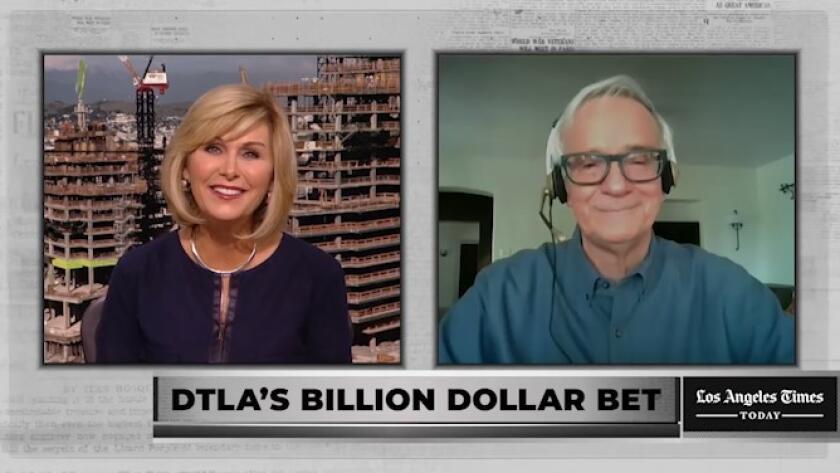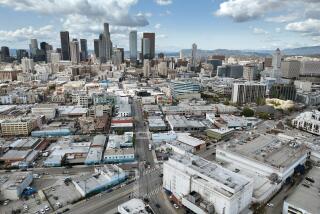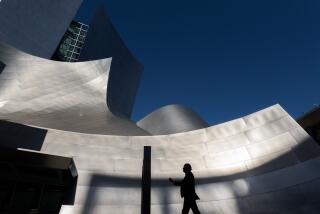The $1-billion bet that people will return to downtown L.A. after COVID
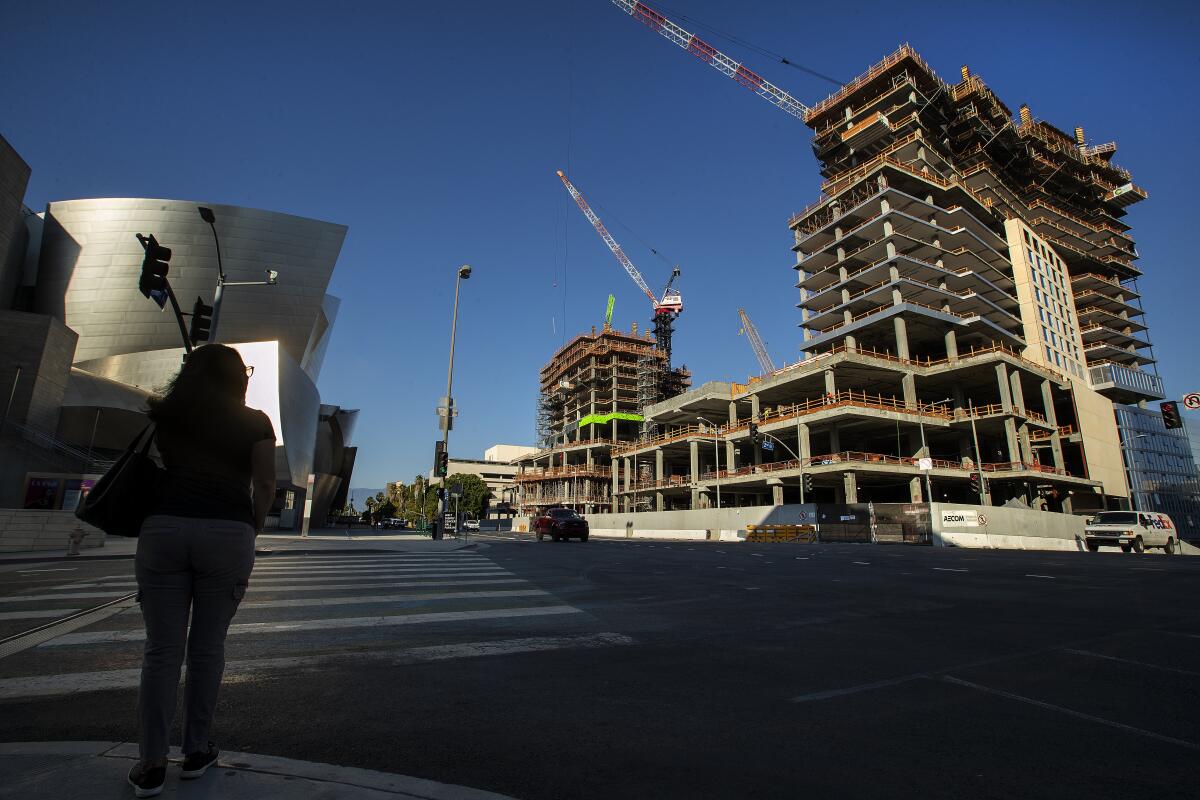
- Share via
While the COVID-19 pandemic forces Americans to avoid each other and challenges the desirability of offices, museums and other shared institutions, the builders of a $1-billion project in downtown Los Angeles are betting that the city will revive and people will come together again in large numbers.
Work on the Grand, a long-anticipated mixed-use complex designed by architect Frank Gehry has reached the halfway mark as construction carries on unobtrusively through the pandemic.
The towering collection of apartments, stores, restaurants, movie theaters and a luxury hotel is rising on a full city block across Grand Avenue from Gehry’s famed Walt Disney Concert Hall at a time when few are around to witness its creation.
Bunker Hill’s office buildings are mostly unoccupied, as are government offices and courtrooms in the nearby Civic Center. Art institutions steps away from the Grand are closed for the pandemic, including the Broad, the Museum of Contemporary Art and the Music Center. Tourists who swoop by to get a selfie in front of Disney Hall have gone missing as fear of COVID-19 dampens leisure travel.
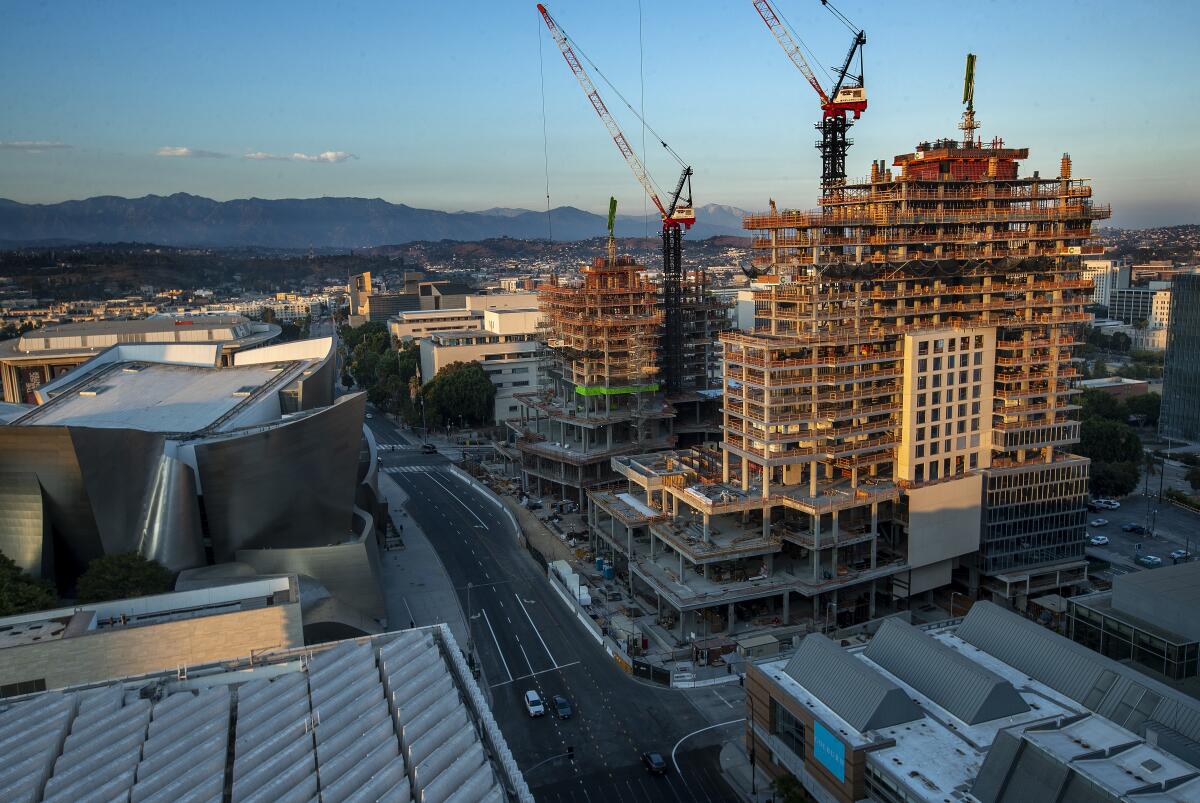
So in this uncertain time, the aptly named Grand has turned almost into a stealth project, an audacious potential landmark dreamed up by one of the world’s most famous architects coming together with all the fanfare of a five-story apartment building.
Even Gehry doesn’t tour the construction site as much as he would like, as aides try to shelter the 91-year-old.
“I would go more often that I do, but they won’t let me,” he said in a teleconference. Instead, “I fly over it,” he said, courtesy of a friend with a small plane.
What he can see now are the frames of two towers, rising at a steady clip as concrete is poured from tall cranes. The 20-story Equinox hotel is on pace to top out by the end of the year and the 39-story apartment tower should reach its peak height in early 2021.
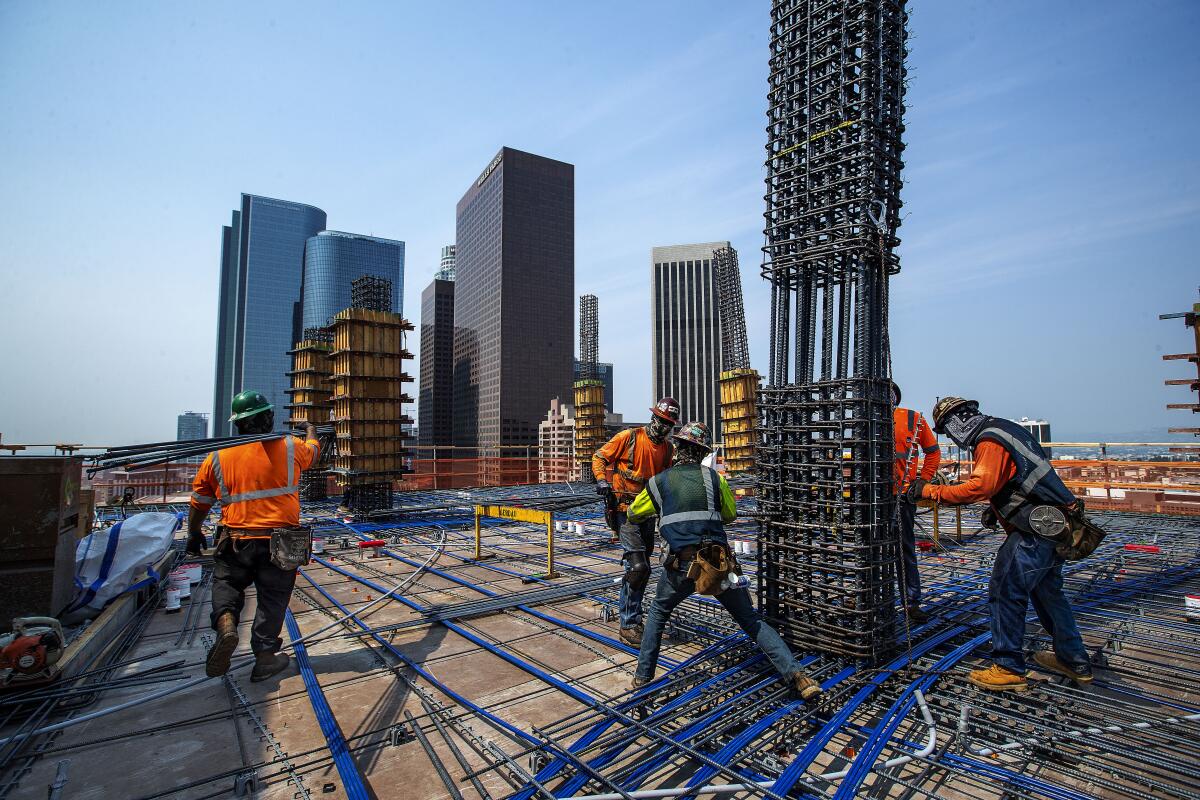
The entire complex will be done by early 2022, said Rick Vogel, who is overseeing the project as a senior vice president at New York developer Related Cos.
The full-speed construction of the Grand stands in contrast to the idle cranes at Oceanwide Plaza, another downtown mixed-use development valued at more than $1 billion, where work stopped early last year as its Chinese developers apparently ran out of money. Although it predates the pandemic, the breakdown in development of the hotel, condominium and retail complex near Staples Center demonstrates how quickly economic tides can turn and upend real estate markets.
Many of downtown’s office buildings are nearly 90% empty at the moment, according to real estate brokers, and the percentage of space that is not leased may edge up to 20% before the pandemic is over, far above the amount that is considered healthy. Hotels also are suffering high vacancy rates.
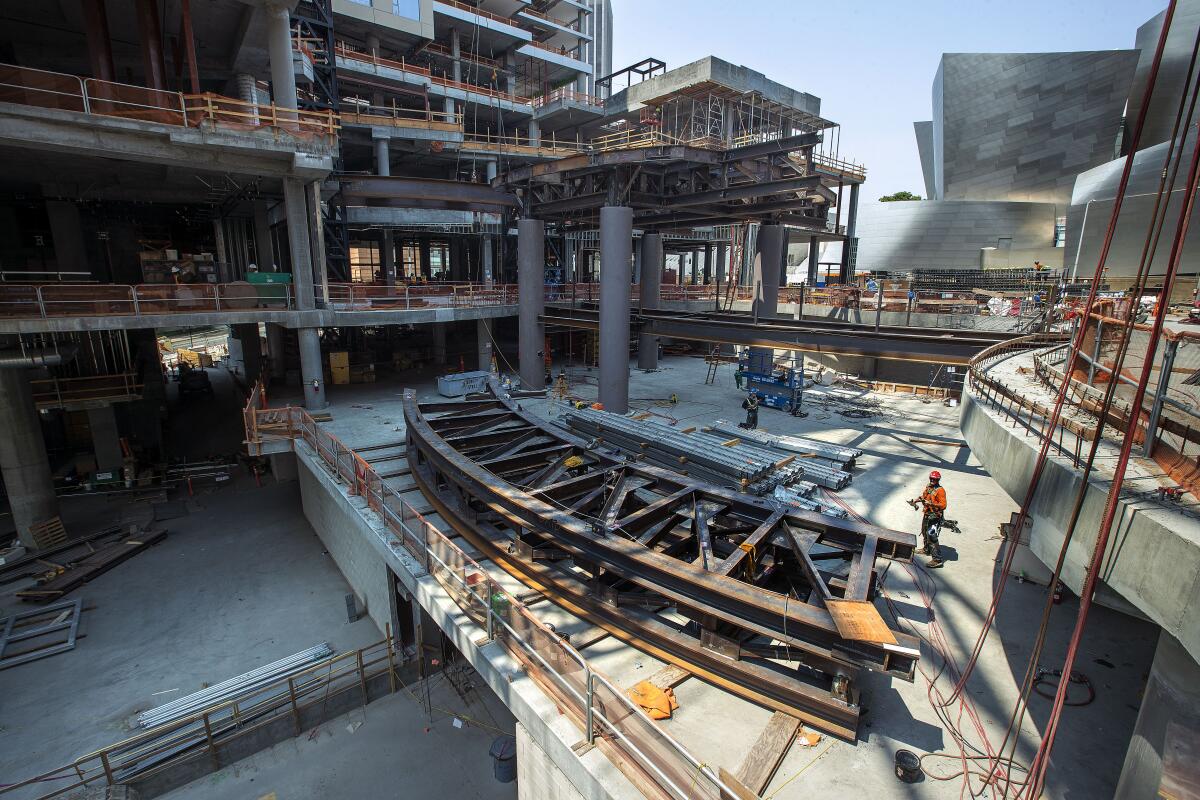
In June, the Singapore-based owner of the 73-story U.S. Bank Tower said it will sell the property for $430 million, a 34% discount from its pre-pandemic valuation as tenants in the building reduced or closed down their operations.
The Grand appears to be well-financed, however.
Related is developing the project with its partner Core USA, a joint venture of China Harbour Engineering Co. and CCCG Overseas Real Estate. CCCG Overseas is a subsidiary of China Communications Construction Group, one of China’s largest state-owned companies.
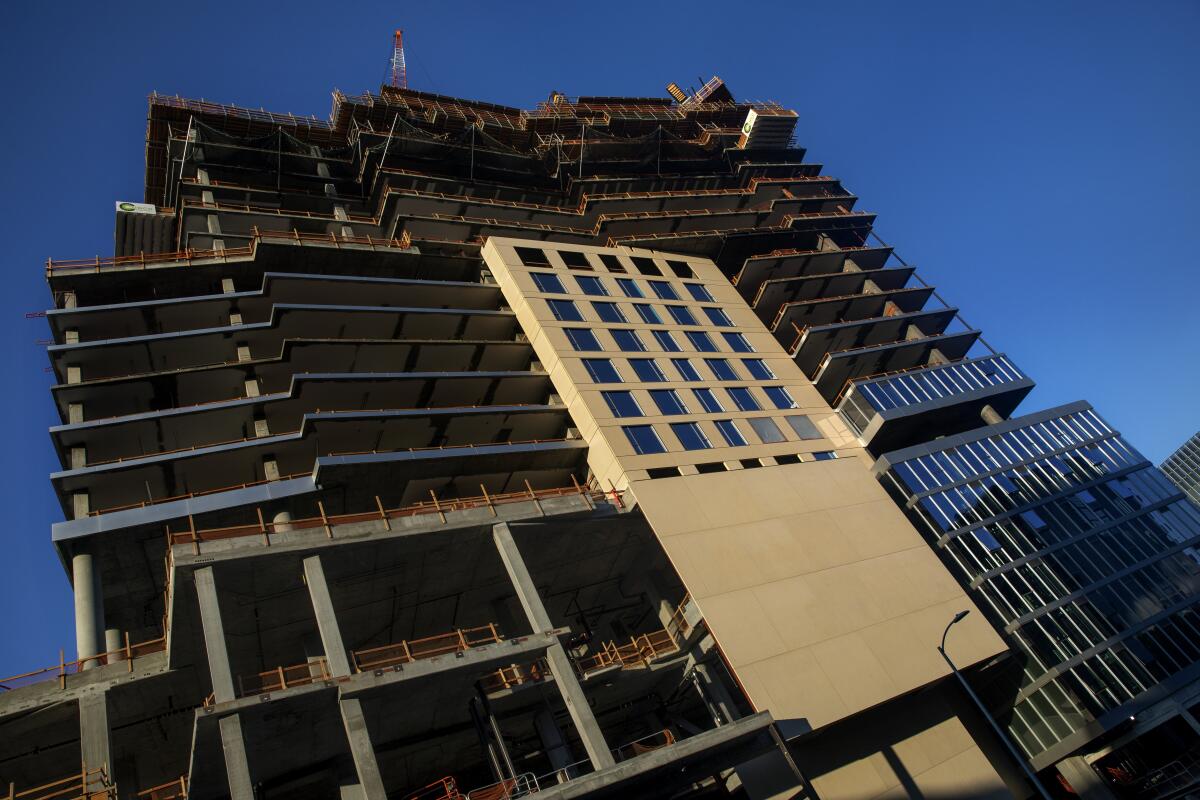
Core invested $290 million in the Grand, which helped Related secure enough financing to get construction underway in late 2018 after years of delays — Related first got the contract to create the massive Grand Avenue Project in 2004. Other projects built through a joint-powers authority administering the redevelopment plan include the 12-acre Grand Park, the Broad art museum and the Emerson apartment tower next to the Broad.
The Grand will have a mix of shops and restaurants spread among a series of landscaped open terraces, along with a roughly 430-seat cinema complex on the east side above Olive Street. The Equinox hotel will have 309 rooms and a 39-story residential tower with 436 luxury apartments. Related will offer subsidized rents to low-income tenants for 20% of the units.
It’s one of the largest active construction sites in Southern California with about 400 workers a day, all of them following protocols meant to curb transmission of COVID-19.
“Back in February we got very concerned,” Vogel said, as the pandemic reached American shores.
Since March 1, workers have been screened daily with health questionnaires and a body temperature check. They wear masks and work six feet apart as much as they can. If a task such as pipe fitting requires people to work close to one another, they wear face shields as well as masks.
So far, fewer than a dozen workers have been diagnosed with COVID-19, Vogel said.
“We can only react,” he said, “because we don’t know where they get it.”
Although the very premise of the Grand depends on the return of a world where COVID-19 is not a threat, the pandemic has sharpened the developers’ commitment to using technologies that limit visitors’ need to touch surfaces they would rather not handle such as door pulls, elevator buttons and credit card receipts.
“We are so conscious of things we are touching,” he said. “It’s habitual now. Most of us believe the world will never be the same.”
The goal is to make public spaces at the Grand, “touchless, frictionless and cashless,” Vogel said, and the indoor air at the hotel should be “surgical suite quality.”
The pandemic has stoked interest in outdoor dining, which the Grand will serve up at some of its six or more restaurants that will look out from terraces onto Bunker Hill and the downtown skyline.
With the Grand, Gehry will also be able to complete a trick he baked into his design for Disney Hall — its surfaces were carefully arranged to receive light projections from across the street. When the L.A. Phil is performing inside, the live concert can be shown on multiple walls of Disney Hall to entertain people on the street and in the Grand.
“You can sit in a restaurant in the evening and watch a concert being projected on the wall,” he said. “We have tried it and it really works.”
The projections are part of the goal to make the Grand feel welcoming to people of modest means as well as those wealthy enough to check into the Equinox before an evening of dining and drinking paced around a concert or art show.
“To have a hotel room, there has always been a dream” for certain Westside residents, said Gehry, who lives in Santa Monica, but “those are the fancy people.”
Vogel acknowledged that, “there is a concern out there that because it’s a Related project, it’s going to be for rich people.” Related has a reputation for building upmarket projects such as mixed-use complexes Hudson Yards and Time Warner Center in Manhattan, and the pricey Emerson apartments.
The Grand will have a landscaped public plaza with open seating and free events such as concerts. Food will be sold at multiple price points including “a $10 lunch,” Vogel said. “It has something for everyone.”
Gehry said they are “hopefully creating a good public space for the future, for the whole community.”
Part of the challenge of designing the Grand was to make it complement Disney Hall but not compete with it visually. Early plans that included a skyscraper were scaled back.
“It’s respectful of the other buildings, hopefully creating a good public space for the future,” Gehry said. “I’m very proud of it.”
Gehry’s vision for Bunker Hill also includes a concert hall for the Colburn School of performing arts, an outdoor concert plaza east of the Grand and renovations to Disney Hall that would add a jazz club and a bar.
The Grand is a “transformational” development, said Jessica Lall, president of business advocacy group Central City Assn., “bringing to life what many had imagined for downtown during this revitalization that has been taking place over the past two decades.”
“I think it will be great once we are able to wake up and interact post-COVID to have this landmark remind everyone what Los Angeles stands for in terms of connections among ourselves, diversity of culture and inspiration.”
- Share via
Watch L.A. Times Today at 7 p.m. on Spectrum News 1 on Channel 1 or live stream on the Spectrum News App. Palos Verdes Peninsula and Orange County viewers can watch on Cox Systems on channel 99.
More to Read
Inside the business of entertainment
The Wide Shot brings you news, analysis and insights on everything from streaming wars to production — and what it all means for the future.
You may occasionally receive promotional content from the Los Angeles Times.
